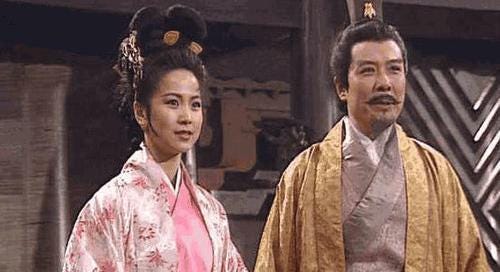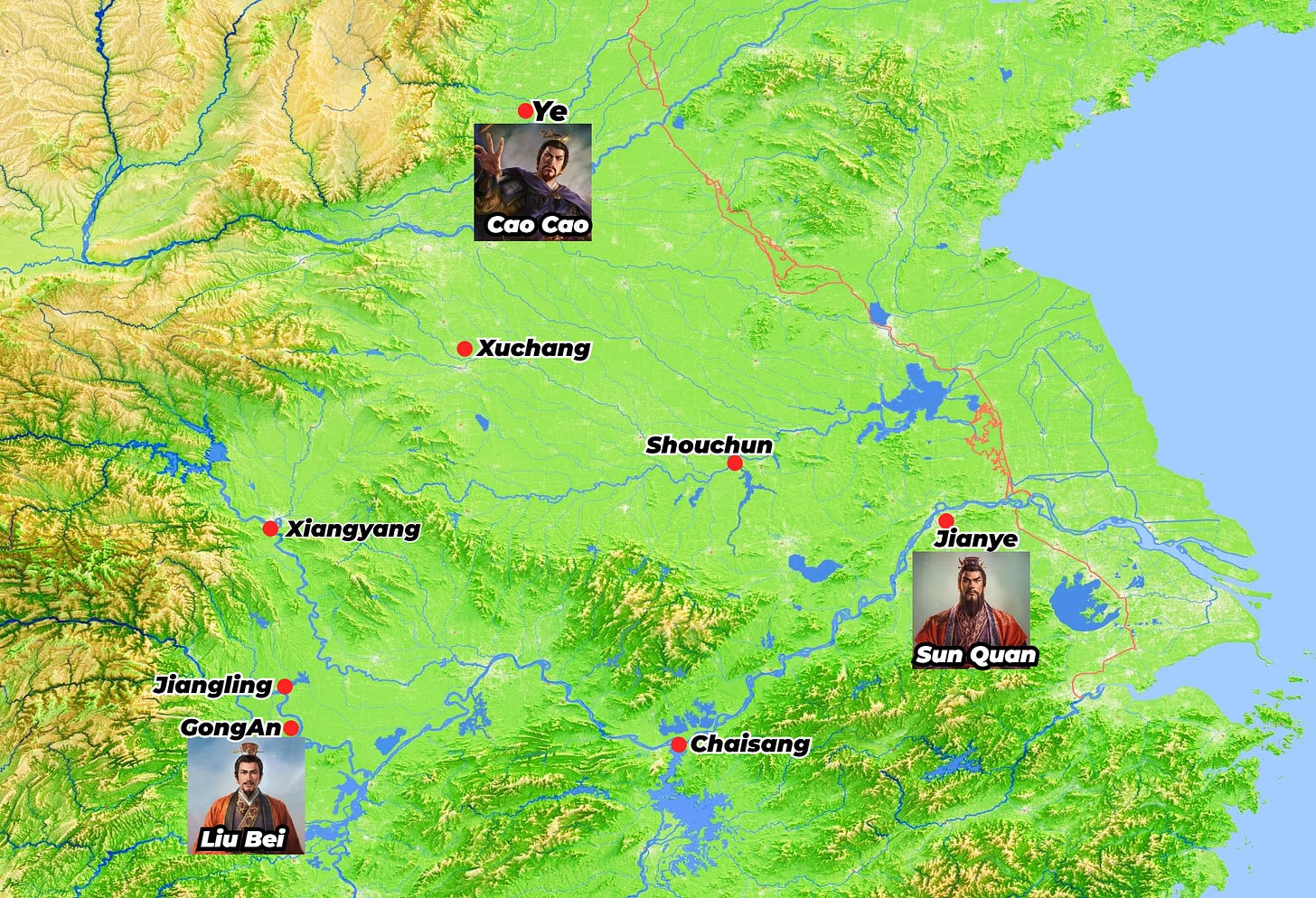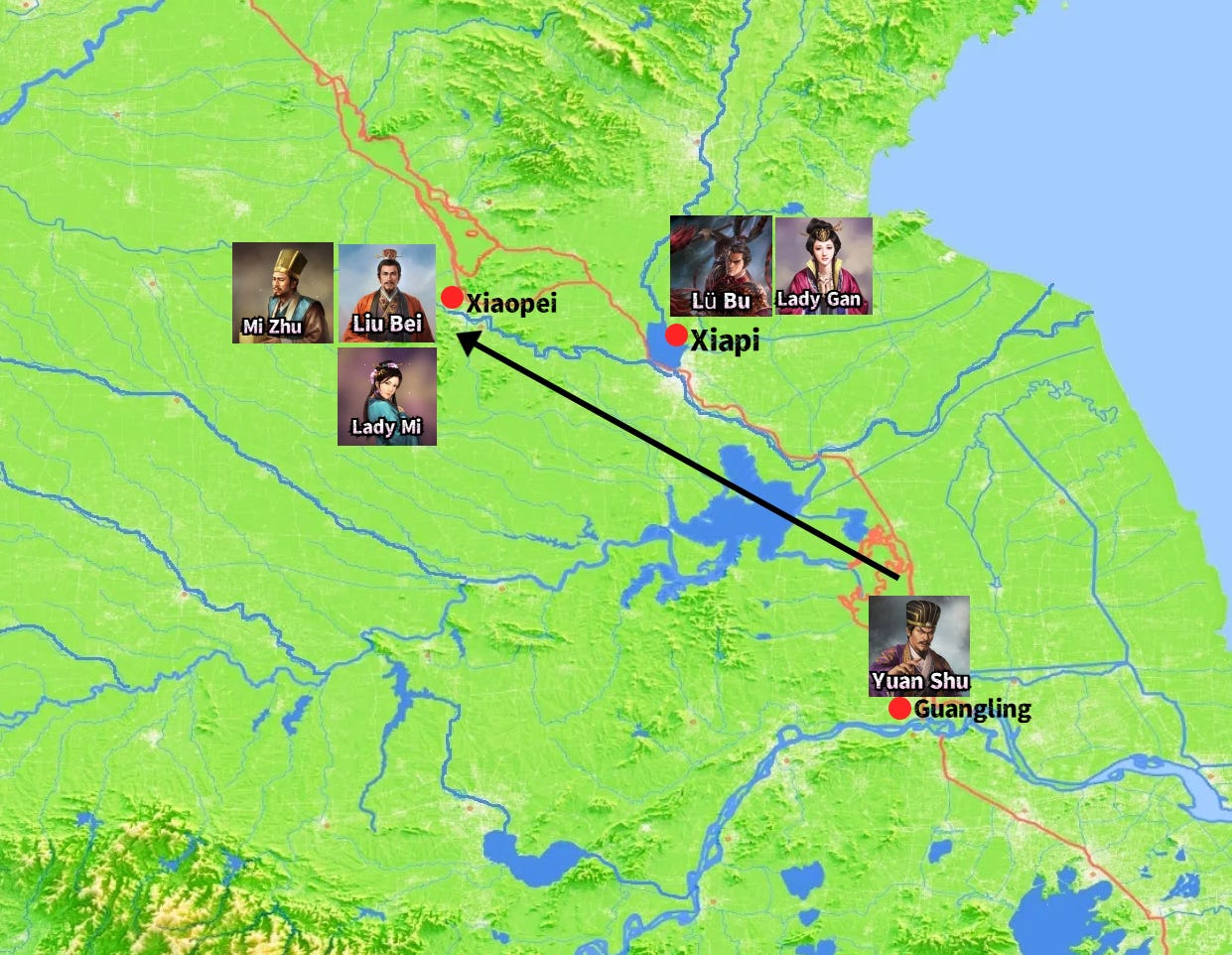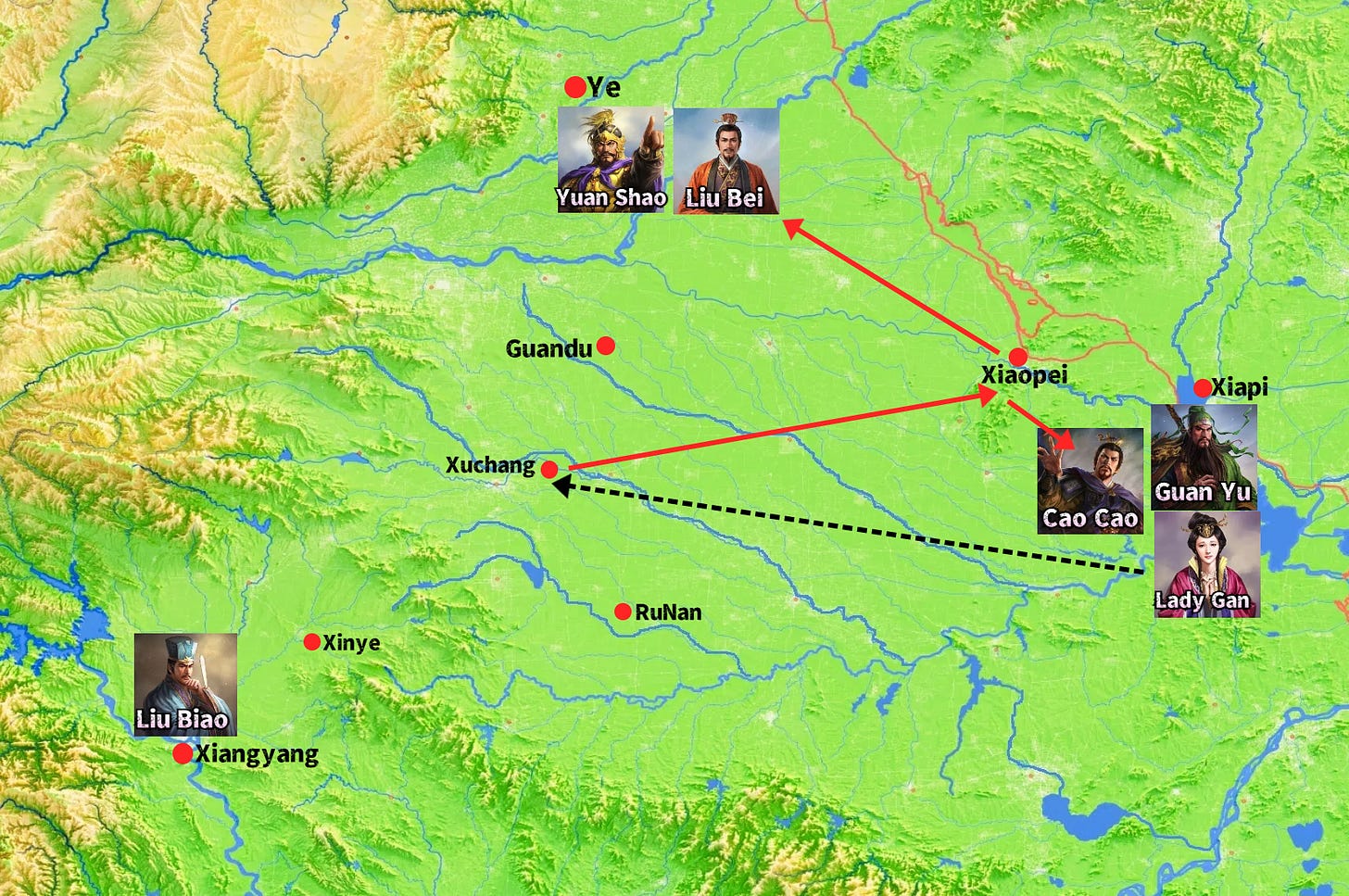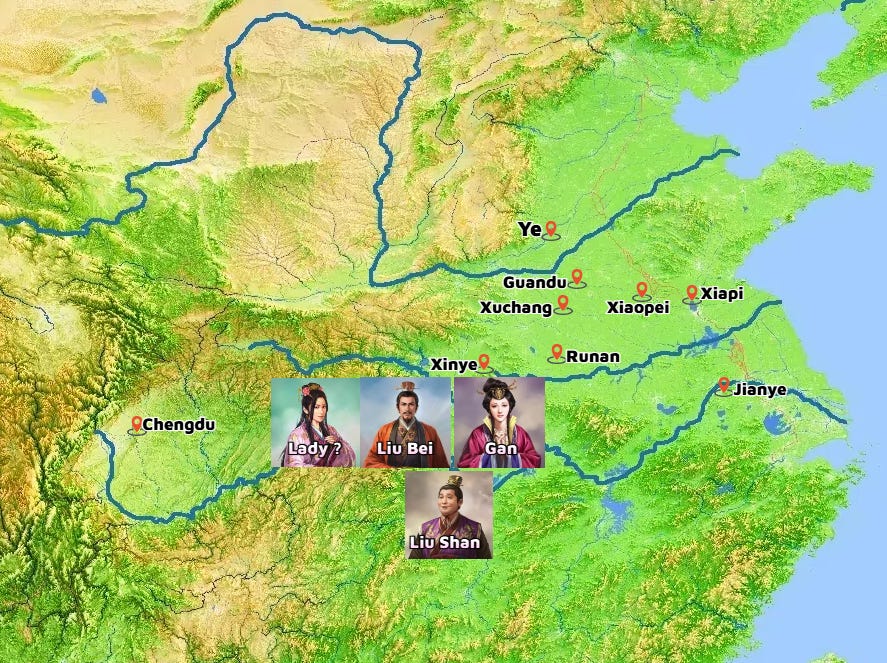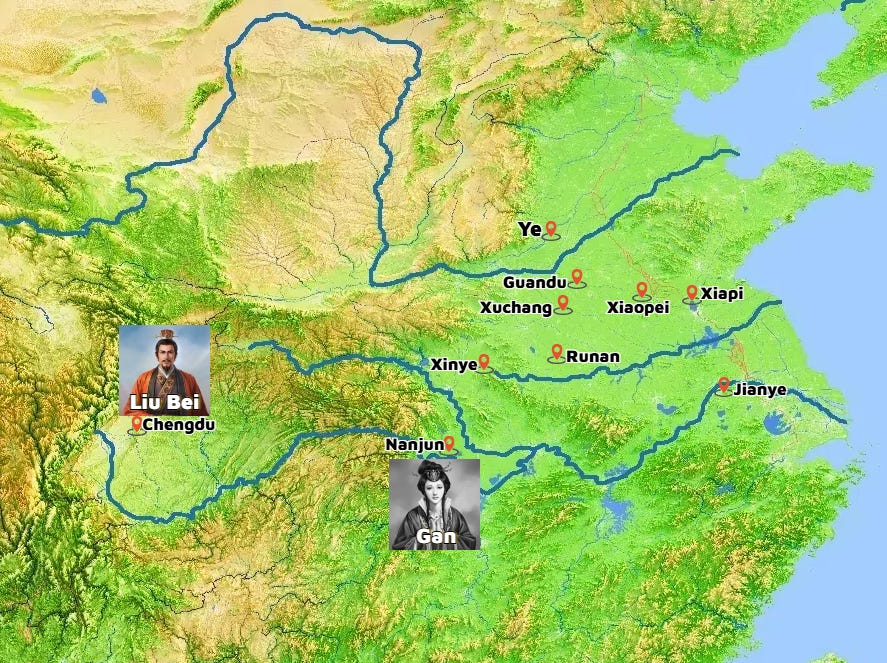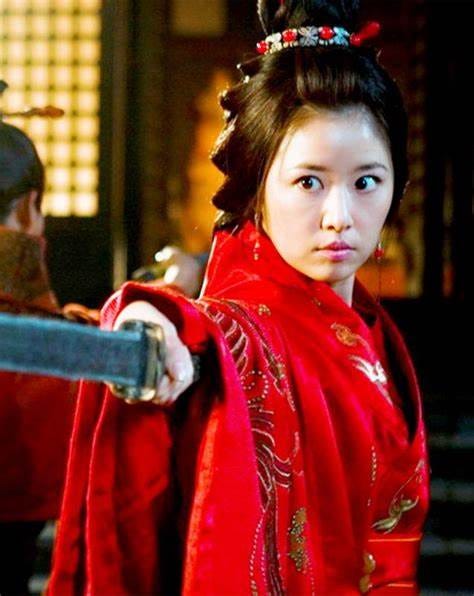one of the most perilous roles in the Three Kingdoms (Three Kingdoms 60)
Liu Bei's Wives and concubines
Previous Chapter :Hefei. The Nightmare Starts Here(208-209AD)
After Cao Ren withdrew from Jiangling, the Province of Jingzhou enjoyed a prolonged period of peace.
Liu Bei needed to consolidate his newly occupied territories, while both Cao Cao and Sun Quan urgently sought a truce to catch their breath. The aftershocks of the Battle of Red Cliffs had temporarily subsided.
Seizing the opportunity, Liu Bei occupied vast lands in southern Jingzhou and won widespread support from the remnants of Liu Biao and Liu Qi (Liu Biao's eldest son). This made Sun Quan sense a whiff of danger.
To strengthen their alliance, Liu Bei sent Sun Quan a "grand gift"—nominating him as Acting "General of Chariots and Cavalry"车骑将军 (the Third-highest position among military generals) and Governor of Xuzhou (徐州牧). In return, Sun Quan tacitly acknowledged Liu Bei's position as Governor of Jingzhou and offered to marry his younger sister to Liu Bei.
By this time, Liu Bei was already a renowned figure and certainly not lacking in wives or concubines. However, his life of constant upheaval had led to a bad habit of abandoning his family. Ironically, while his own life was remarkably resilient, most of his wives and concubines met unfortunate fates.
Liu Bei's Early Marriages and Family Misfortunes
194 AD: While stationed in Xiaopei for the first time, Liu Bei took Lady Gan, a local woman, as his concubine. According to the Records of the Three Kingdoms, by this point, Liu Bei had already "lost multiple principal wives" (数丧嫡室).
Lady Gan: Exceptionally beautiful, known for her "jade-like skin and snow-white complexion," she was dignified and virtuous. Her only drawback was her low birth status, which prevented her from being promoted to principal wife despite Liu Bei's favor.
Two years later: As Governor of Xuzhou, Liu Bei was defeated by Yuan Shu in the front and ambushed by Lü Bu in the rear. His family, including Lady Gan, was captured by Lü Bu.
Thanks to Mi Zhu's financial support and the marriage of his sister (Lady Mi) to Liu Bei, he managed to recover. Lady Mi thus became Liu Bei's principal wife.
Later, Lü Bu returned Lady Gan and the other family members to Liu Bei, allowing him to regroup in Xiaopei.
Another two years later: Liu Bei and Lü Bu clashed again. Xiaopei fell, Liu Bei fled, and his family was once again captured by Lü Bu. Liu Bei had no choice but to seek refuge under Cao Cao.
Fortunately, Cao Cao soon defeated and executed Lü Bu, and Liu Bei's family was returned to him.
After a brief stay in Xuchang, Liu Bei took advantage of an opportunity to attack Xuzhou while intercepting Yuan Shu. His family followed him back to Xuzhou.
Liu Bei stationed his army in Xiaopei but left his family in Xiapi, guarded by Guan Yu.
Before the Battle of Guandu: Cao Cao launched a sudden eastern campaign against Xuzhou. Knowing he was outmatched, Liu Bei fled alone, while Guan Yu surrendered. Liu Bei's family fell into Cao Cao's hands.
Historical records mention Cao Cao's particular fondness for Guan Yu but say nothing about the fate of Liu Bei's family.
After joining Yuan Shao, Liu Bei was sent to Runan to collaborate with Liu Biao in harassing Cao Cao. Guan Yu also left Cao Cao's camp at this time and reunited with Liu Bei in Runan.
The Novel “Romance of the Three Kingdoms” fictionalizes Guan Yu's meticulous care for Liu Bei's wives and his escorting them back to Liu Bei—there is no historical basis for this.
Lady Mi disappears from records after returning to Liu Bei following Lü Bu's death, likely having passed away early. Thus, her later dramatic suicide in the Battle of Changban (as depicted in the novel) is pure fiction.
Lady Gan’s Miraculous Survival
Despite the chaos, Lady Gan somehow returned to Liu Bei’s side.
Speculation: After Cao Cao captured Liu Bei’s family, he likely sent them to Xuchang. Guan Yu, after killing Yan Liang for Cao Cao, may have retrieved Lady Gan while traveling to reunite with Liu Bei in Runan. But what happened to the rest of Liu Bei’s family? The historical records are silent, leaving much to speculation.
After Cao Cao's victory at Guandu, he turned south to attack Liu Bei. This time, Liu Bei was prepared and calmly retreated to Xinye, seeking refuge under Liu Biao.
For six years in Xinye, Liu Bei lived in relative peace. Aside from Liu Shan (born to Lady Gan in 207AD), Liu Bei’s household likely expanded—he probably took another principal wife, though no records confirm this.
208 AD: Cao Cao launched a massive southern campaign against Jingzhou. Liu Cong (Liu Biao’s younger son, the new Governor of Jingzhou) surrendered, forcing Liu Bei into a desperate southward flight. At the Battle of Changban, Liu Bei was defeated by Cao Cao’s elite "Tiger and Leopard Cavalry" (虎豹骑).
After the Battle of Red Cliffs, Liu Bei seized southern Jingzhou, finally ending his days of dependence and entering a new phase of life.
Lady Gan’s Fate
Lady Gan was remarkable—despite being a concubine, she managed Liu Bei’s household and bore him his only son at the time. As one of the most perilous roles in the Three Kingdoms—being Liu Bei’s family member—she repeatedly escaped danger. If Liu Bei’s life was resilient, hers was even more so!
Her tomb is located on the northern bank of the Yangtze River in Nanjun Commandery, suggesting she likely died around the time Liu Bei entered Shu(212-214AD).
222 AD: During the stalemate at the Battle of Yiling (夷陵之战), Liu Bei, then campaigning in Nanjun Commandery, ordered Lady Gan’s remains moved to Chengdu for burial. However, before her coffin arrived, Liu Bei himself passed away in 223 AD.
Posthumously, the Shu Han court honored her as "Empress Zhaolie" (昭烈皇后,Liu Bei is the Emperor Zhaolie) and buried her alongside Liu Bei in Chengdu. Their tomb is located in the present-day Zhaolie Temple/Wuhou Shrine (昭烈庙/武侯祠).
Now we Have covered Liu Bei's early wives and concubines, we now come to Sun Quan's reciprocal gesture of marrying his younger sister to Liu Bei. But who exactly was this "Miss Sun" - the famous "Sun Shangxiang孙尚香" in novels and games - in actual historical terms?
To be Continued.
Your support is my greatest motivation!

